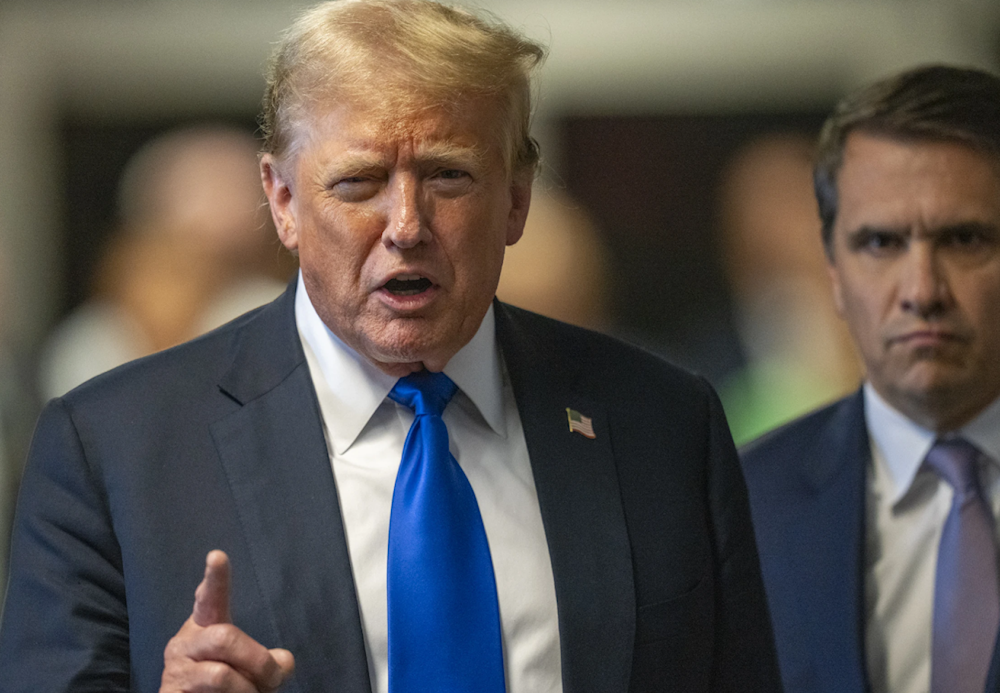Trump can still be president as convicted felon: Politico
A New York jury found Trump guilty of falsifying documents to conceal a payment made to silence an adult actress, Stormy Daniels, before the 2016 election.
-

Former President Donald Trump speaks outside the courtroom after a jury convicted him of felony crimes for falsifying business records in a scheme to illegally influence the 2026 election at Manhattan Criminal Court in New York on May 30, 2024. (AP)
Donald Trump's conviction in a hush-money case does not exclude him from running or serving as president of the US, Politico reported.
On Thursday, May 30, Donald Trump became the first US president to be convicted of a crime. After the conviction, Trump left the courthouse in a motorcade and arrived at Trump Tower.
A New York jury found Trump guilty of falsifying documents to conceal a payment made to silence an adult actress, Stormy Daniels, before the 2016 election.
As a contender for the presidency, Trump is only limited by the provisions of the United States Constitution. The prerequisites are straightforward: The president must be at least 35 years old, a natural-born citizen of the United States, and have resided there for at least 14 years. There's no mention of criminal convictions.
If Trump is sentenced to prison and wins, practicality may be the only obstacle. It's unlikely he could manage the country from jail, and some legal experts believe the resultant constitutional crisis would necessitate suspending his sentence to complete his obligations as the nation's chief executive. It might be a few weeks before the judge in the hush money case sentences Trump, who could face up to four years in prison or none at all.
In addition, he is far from the first criminal to run for politics.
Most notably, Socialist Party nominee Eugene V. Debs campaigned for president in 1920 from a jail cell while serving a 10-year federal term for encouraging his supporters to oppose the World War I draft. He received 3% of the votes.
Both Trump and Debs utilized legal difficulties as talking points to rally their supporters. Supporters of Debs donned lapel buttons that said "Convict No. 9653."
During his Manhattan trial, Trump addressed campaign rallies every day from the corridor outside the courthouse and has made his indictments a key theme of his 2024 campaign.
Appealing to donors, Trump vows to deport pro-Palestine protesters
Trump recently addressed a roomful of donors, which he joked included "98 percent of my Jewish friends," vowing to expel student protesters from the US and crush pro-Palestine protests on US campuses, according to participants in the roundtable event with him in New York, The Washington Post reported.
The donors revealed that Trump said on May 14, "One thing I do is, any student that protests, I throw them out of the country. You know, there are a lot of foreign students. As soon as they hear that, they’re going to behave."
In opposition to what Trump was saying, The Post reported that one of the donors said that many of these students and professors taking part in these protests could one day hold positions of power in the US, which Trump responded to by labeling them as part of a "radical revolution", which he promises to defeat.
Trump did not stop there, but he rather praised the New York Police Department for clearing the campus at Columbia University by cracking down on students and called on other cities to do the same, stressing that "it has to be stopped now."
It is noteworthy that US police were seen in multiple videos being violent with the protesters amid an intense crackdown on the peaceful protests.
Getting to his actual point, the donors said that Trump added, "Well, if you get me elected, and you should really be doing this if you get me reelected, we’re going to set that movement back 25 or 30 years."
Keeping in mind that in recent months, major Republican donors have lobbied Trump to take a firmer stance in support of "Israel", The Washington Post said that this meeting provides a deeper view into Trump's current thinking as he told wealthy donors in the meeting that he supports "Israel's" right to proceed with "its war on terror" and then showcased his White House policies toward "Israel".
He repeatedly listed to the donors everything he claimed he had done for "Israel" during his presidency, from transferring the US embassy to al-Quds, recognizing the occupied Syrian Golan heights, and bucking decades of US policy.

 4 Min Read
4 Min Read








